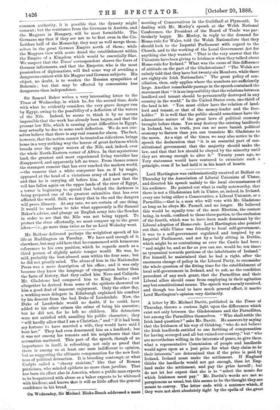Mr. Balfour delivered perhaps the weightiest speech of his life
at Haddington on Tuesday. We have said enough of it elsewhere, but may add here that he commenced with humorous references to his own position, which he regards much as a third person of slightly satiric temper would. He was, he said, probably the best-abused man within the four seas; but he did not greatly mind. The abuse of him in the Nationalist Press was a mere description of his office ; and it was only because they knew the language of vituperation better than the facts of history, that they called him Nero and Caligula. Mr. Gladstone had compared him to King Bomba ; and altogether he derived from some of the epithets showered on him a good deal of innocent enjoyment. Only the other day, a working-man delegate in Edinburgh explained his conduct by his descent from the bad Duke of Lauderdale. Now, the Duke of Lauderdale would no doubt, if he could, have added to his other crimes the crime of being his ancestor; but he did not, for he left no children. His detractors were not satisfied with assailing his public character; they "will hardly allow that I am a Christian ;" and "if it had been my fortune to have married a wife, they would have said I beat her." They had even denounced him as a landlord ; but it was not among his tenants and his neighbours that that accusation mattered. This part of the speech, though of no importance in itself, is refreshing, not only as proof that there is among us at least one man indifferent to opinion, but as suggesting the ultimate compensation for the new foul- ness of political detraction. It is breeding contempt, or what Carlyle called a "cheery stoicism," like that of Roman patricians, who minded epithets no more than javelins. That has been its effect also in America, where a public man expects to be bespattered with abuse as a baker expects to be whitened with his flour, and knows that it will as little affect the general confidence in his bread.


































 Previous page
Previous page